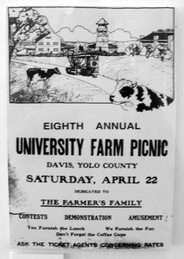 Picnic Day has its origins in the University Farm Picnic in the early half of the last century.
Picnic Day has its origins in the University Farm Picnic in the early half of the last century.
| Location |
| All across the UC Davis campus |
| Date |
|
Look for past dates below; future date will be announced as soon as it becomes available |
| mailto:[email protected] |
| Website |
| http://picnicday.ucdavis.edu |
| Parent Organizations |
| Associated Students of UC Davis (ASUCD) and |
| Student Programs & Activities Center (SPAC) |
| Established |
| 1909 |
| Planners |
| Picnic Day Board of Directors |
The University of California, Davis, will host the 101 edition of Picnic Day, its annual open house and oldest honored tradition, on Saturday, April 18, 2015. Picnic Day has an expected attendance of 125,000 visitors and is believed to be the largest student-run event in the nation. In 2007–2008 an estimated 100,000 people attended and reports for the UC Davis Centennial (2008–2009) place attendance anywhere between 125,000 and 150,000. Current and prospective students, alumni, staff, faculty, and people from everywhere are invited to attend this festive day that showcases the talents, achievements and history of the university. With more than 150 free events throughout campus, Picnic Day provides fun and education for all ages.
Picnic Days are documented at:
- Picnic Day 1909 - The first Picnic Day
- Picnic Day 1916
- Picnic Day 1917
- Picnic Day 1924
- Picnic Day 2005
- Picnic Day 2006
- Picnic Day 2007
- Picnic Day 2008
- Picnic Day 2009
- Picnic Day 2010
- Picnic Day 2011
- Picnic Day 2012
- Picnic Day 2013
- Picnic Day 2014
- Picnic Day 2015
- Picnic Day 2016
- Picnic Day 2017
- Picnic Day 2018
- Picnic Day 2019
- Picnic Day 2020 ❌
- Picnic Day 2023
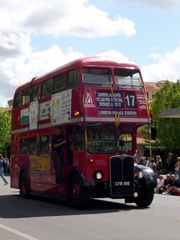 A double decker bus
A double decker bus 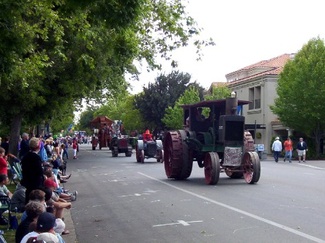 A tractor in the parade
A tractor in the parade 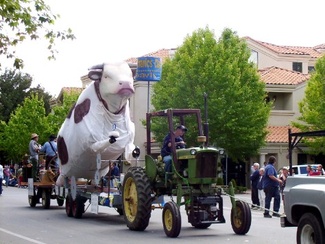 Yet another tractor in the parade
Yet another tractor in the parade
Also see the Whole Earth Festival, another large campus festival.
Picnic Day is the day every April when anybody who has ever lived in Davis or attended UC Davis comes back to town and wanders around Campus and Downtown. There's a giant parade in the morning and events and exhibitions all over the place. The parade starts with words from the Chancellor and the Picnic Day parade marshals and then a terrific performance by the California Aggie Marching Band-Uh. Three of the highlights of Picnic Day are the Doxie Derby, the Fashion Show, and the Battle of the Bands. The battle of the bands always features both Band-uh and The marching lumberjacks. Student bands and dance groups can be seen on any of the various stages. The event tries to capture many things that are quintessentially Davis. It is an agricultural showcase and open house for school organizations.
In 2004 there were two Battle of the Bands events, one being marching bands from all over California and the other being local rock bands (this was called the Davis Rock Challenge). The winner of the Davis Rock Challenge was Doug Douglas. In 2005 the organizers of Picnic Day decided to reduce the amount of live music offered and not have the Davis Rock Challenge, but rather host a dance competition called the Davis Dance Revolution (DDR). DDR is open to all registered student organizations to enter and is co-hosted by Campus Unions, SPAC, and Picnic Day.
Many students love Picnic Day because they wake up in the morning and start drinking. Their love is shown in their drunken appearance wandering the streets and the massive amounts of garbage that line their party districts the next morning. This has led to conflict with the community, including the Sterling Riot in which early Picnic Day celebrations turned violent.
Picnic Day Themes & Parade Marshals
As the campus' premier event and oldest tradition, prominent members of the UC Davis Community are often honored for their contributions as Parade Marshals. They typically get to ride int he Wells Fargo Wagon
Organization
| This UC Davis program receives ASUCD subsidies. |
Picnic Day is run by 16 students who form the Board of Directors. Each director handles a separate area or event. Picnic Day planning for the next year begins shortly after the end of each year's event. Each director usually has 1-3 assistants who help in the planning and execution of Picnic Day each year. Picnic Day dates are chosen 7-8 years in advance. The Picnic Day Chair is nominated by the ASUCD President and confirmed by the ASUCD Senate. Other members of the board are hired at the sole discretion of the Chair.
The event is sponsored by the University and ASUCD, in fact ASUCD put $20,519 into the 2004 Picnic Day budget. (Whole Earth Festival, another University event and ASUCD unit is not subsidized at all.) Picnic Day's funds support communications (radios & sound for stages) , equipment, printing (posters, flyers, schedule of events etc.), technical support (web and sound equipment for stages & classrooms), hiring multi-cultural Entertainment/performers, the Multi-Cultural Children's Faire, stage rental from another ASUCD unit, food and t-shirts for the volunteers, among many other things that must be paid for to bring Picnic Day to UC Davis. The money helps Picnic Day remain free from being overly commercialized (meaning where Picnic Day would be dependent on sponsorships or dependent on selling items to make money instead of focusing on being the university's open house), and allows student organizations to fundraise through selling food and other items. It is estimated that the University provides for nearly 75% of the cost of running Picnic Day, with ASUCD contributing the remaining 25%. Picnic Day although not as commercialized as Whole Earth Festival benefits from various community sponsorships.
See also: International Picnic Day Solidarity Movement
Covid-19 and Virtual Picnic Days
The 2020 and 2021 Picnic Days were during the peak of the Covid-19 pandemic at a time when the city had significant restrictions related to social gatherings, including wearing masks indoors being required. In-person picnic day was cancelled for these years. Instead, there was a virtual picnic day that offered asynchronous events people could view online. In-person picnic days returned with the 2022 Picnic Day.
2010 Cancellation Threat
On April 21, the Sacramento Bee reported that campus and community leaders were considering canceling UC Davis' annual Picnic Day due to the high number of arrests and mayhem during Picnic Day 2010. A Save Picnic Day - UC Davis Students Facebook Page was created and gained upwards of 7,000 members. There was aFacebook page for alumni to help. There was also a petition going around asking the city council to pass an ordinance that would restrict the sale and serving of alcohol on picnic day.
White Family Day
Some people refer to Picnic Day as White Family Day, a play on the university's Black Family Week/Black Family Day. The phrase is meant to draw attention to some sort of racist undercurrent in Picnic Day. References to this term have been found in Aggies The California Aggie as old as 1986. However 2005's Picnic Day featured a variety of cultures, including an all-black color guard/percussion squad, as well as the Jewish Student Union, which participates in Picnic Day every year and advocates diversity in culture. Also, since Picnic Day 2002, there has been a Multicultural Children's Faire (MCF) held at Hart Hall where children can make crafts from all over the world. Although it is unclear whether this refers to the mistaken perception that the word "Picnic" has racist overtones, most modern etymologists agree that the roots of the word do not. The Picnic Day Board of Directors is a broad cross-section of the community. In recent years some ethnic student groups or centers have refused to participate or attend, which may in itself create a self-fulfilling prophecy. Nevertheless, today Picnic Day is an event for the entire community and provides every opportunity for everyone to participate.
Is this really a suborg of ASUCD? I thought it was affiliated, but not entirely under the control of ASUCD as the head of this entry suggests. — jw
- It's pretty much under the direction of ASUCD, but Student Affairs lends a lot of support to Picnic Day. That's why it's called the "nation's largest student run event" —BrentLaabs
- Actually Picnic Day is shared by SPAC & ASUCD, and ultimately falls under the supervision of Student Affairs. The student board is supervised by a SPAC advisor. When I worked for Picnic Day, our Chairwoman seemed to deal with ASUCD for some financial business, hiring personnel, and to fight over office space with other ASUCD units. The majority of our support came from SPAC, Student Affairs, and various other departments including the Alumni Association and the Chancellor's Office. At the time Picnic Day was the unwanted step-child of the ASUCD Senate & Executive Office who completely missed the point of the open house concept and wanted to cut Picnic Day because it wasn't "a money maker". This issue seems to come up in various forms every other year or so depending on the slate in power.
FYI - Picnic Day is called the largest student run event in the nation because, as far was anyone knows, it is the largest student run one-day open house event in the U.S. When it's sunny Picnic Day attracts between 50,000-60,000 visitors to campus. It'd be kinda cool if someone could scientifically confirm both the "largest student run event" claim and estimate the number of visitors to the next event.
The City of Davis does not co-sponsor Picnic Day. The city doesn't contribute any money, people power, or help with the planning of the event. Bob Bowen, the City Events Manager, is quite helpful but it is suspected that his motivation comes from his fondness for Picnic Day as a UC Davis Alumnus and Picnic Day Student Board Alumnus. The city doesn't do much other than allow the Parade to happen downtown and complaining about the mess and police problems. The merchants of Davis who conduct business on Picnic are the big winners of the day.
StevenDaubert thinks that the coolest things about picnic day is the police dog show [which I'm pretty sure is now defunct cause the ARC is on the field that the show used to be on] and the weiner dog races that take place in the rec hall
- The copper doggers are still shown, they do them on the ultimate field behind the new tennis courts near the MU. —TomAbeles
As someone who has served both in ASUCD and Picnic Day, it is frustrating when certain factions in ASUCD refuse to fund or increase funding for Picnic Day. Sure there is a lot of drinking on campus, but Picnic Day is not merely a huge party. It is the annual open house for the campus. Alot of prospective students come to visit on Picnic Day and indeed more than a few decide to come because they get a good feel of the campus from Picnic Day. Other than the CoHo, Unitrans and the commercial units, Picnic Day is the most efficient ASUCD event/program. When you consider how much money other ASUCD units such as Entertainment Council or various programmatic commissions gets (over $70,000 for EC) and the number of people who attend those events they pale in comparison. Picnic Day only gets around $15K-$20K from ASUCD to put on a campus-wide event that more than 100,000 people attend. That's pretty good. Also, for those who are very "socially-oriented", Picnic Day is a great way to showcase the university and a great recruiting tool. Additionally, considering that the event has jumped from 50,000 to 100,000 in a relatively short period of time and has resulted in a rising costs to put on the event, ASUCD funding for Picnic Day barely keeps up with the increase in inflation. It is not for a lack of money. Other units, which affect far less people have been created (and sometimes disbanded) or given larger budgets in a significantly short time in comparison to Picnic Day . Although this certainly raises another issue that I do not wish to debate here, but just purely as an example Lobby Corp which was created in 2002 has gone from a budget of $6,000 to a budget of over $25,000 in just a few years. In addition, ASUCD does not even pay for a majority of the cost and they are always talking about how they want everything student-run. As you can tell, I am very passionate about this particular topic. So I hope that ASUCD stops giving Picnic Day so much trash and recognizes the benefit of Picnic Day. Picnic Day is THE oldest ASUCD unit and it will outlast everything else. It is a solid event that deserves its fair share. —StevenLee
Hope you all enjoyed it, it might be the last one we see here. According to this and many other articles: An end to Picnic Day in Davis —WesOne72
I myself do not drink, but if there is an ordinance limiting the sale of alcohol in Davis, what is stopping people from stocking up the week before or driving up to Costco and getting some ridiculous amount of booze (after of course signing an agreement not to sell the booze). People have gone great lengths and risked much to get drunk in the past, a little ordinance limiting sales probably would not stop people from getting drunk before noon. At most, it might allow more minors to get some alcohol (bars and stores will not sell to minors, but people do hand out booze pretty carelessly). —hankim
-
Nothing. I'd bet that if there were an alcohol ban, people would either get it from out of town, or buy it in advance. Such a ban might have no effect at all. Or, it might help to distribute it from massive parties with hundreds of people to smaller, less wild parties. There might be other options, such as the city's noise ordinance, public endangerment, or any existing law that makes illegal behavior, well, illegal. Do we know what the arrests on picnic day were actually for? Were the problems caused by alcohol, or were people just using it as an excuse to behave badly regardless? —IDoNotExist
-
Whether the problems were caused by alcohol or not, in my opinion a limit on the sale of alcohol would not solve the huge demand for law enforcement that was created this year. My other problem with limiting sales is that people might move from less shady sources of alcohol to more shady sources which might create a rise in slightly more serious crimes. —hankim
-
Well, part of that is clearly caused by the huge number of people around on picnic day. I'm not sure what you mean by a "shady" source of alcohol? —IDoNotExist
-
A person who does not work in a bar or establishment who might have ulterior motives for offering alcohol. —hankim
-
Those are always there... —IDoNotExist
-
But with an ordinance limiting sales by businesses, more people will move to those people.
- Umm...OK. so then you will have drunk people instead of drunk people. But probably fewer drunk people. What's the problem? —IDoNotExist
-
But with an ordinance limiting sales by businesses, more people will move to those people.
-
Those are always there... —IDoNotExist
-
A person who does not work in a bar or establishment who might have ulterior motives for offering alcohol. —hankim
-
Well, part of that is clearly caused by the huge number of people around on picnic day. I'm not sure what you mean by a "shady" source of alcohol? —IDoNotExist
-
Whether the problems were caused by alcohol or not, in my opinion a limit on the sale of alcohol would not solve the huge demand for law enforcement that was created this year. My other problem with limiting sales is that people might move from less shady sources of alcohol to more shady sources which might create a rise in slightly more serious crimes. —hankim
I had similar thoughts to hankim. I guess it depends on who really caused the problems. Some people blame the out-of-towners, some blame students, some blame both. An ordinance limiting the sale of alcohol in Davis would not stop the students from drinking (for the reasons that Han gives), but it would stop the out-of-towners (unless the fraternities and open parties supplied them). As for downtown businesses, my impression is that the restaurants, bars, and hotels benefit from Picnic Day, but that other businesses suffer. —CovertProfessor
-
Bistro33 was doing VERY well. They had hundreds of people partying there. On the other hand, the Farmers Market was almost deserted. —IDoNotExist
-
Was it? I got there a bit late. It seemed a little quieter than usual, but all the tables were taken, my two favorite strawberry vendors were already sold out, and the popcorn line was longer than I felt like waiting on. —cp
- I was there around 12 or 12:30, when it is usually very crowded. There wasn't a line at places that usually have them. Hardly anyone was on the grassy area. —IDoNotExist
-
Was it? I got there a bit late. It seemed a little quieter than usual, but all the tables were taken, my two favorite strawberry vendors were already sold out, and the popcorn line was longer than I felt like waiting on. —cp
One thing that was mentioned by the owner of the bar I work at now was a similar option like the Davis Debit Card used not too long ago. The city sets up a mandatory fee for legal drinking (a portion of that fee to be divided amongst participating bars. For this fee you recieve a wristband allowing you access to every bar in town. No bracelet means no access to a bar for you. This helps to limit the amount of drinking problems at bars, increases the capitol available to pay for increased law enforcement and makes it easy to see who is legit and who is not right off the bat. Say they charge $30.00 per wristband, 20-30% divided amongst participating bars, and assume we get another 75,000 people next year of which a good 50% purchase the wristbands (being a little leniant in that assumption and not overstepping though I would think there are more responsible people than this) This would give the city $787,500.00 in additional funds to pay for the extra police/maintenance/clean-up required. It also puts another $337,000+ back into the bars to make up for some of the losses they will take from not allowing non-wristband wearers into the bars. It works for everyone economically and also seems to make it easier to recognize many of the problems faster. On top of this, those who do cause difficulty at the bars they patron lose the wristband thanks to the due diligence of responsible bouncers. —Wes-P
2011-04-17 21:37:33 Wes, that has too many flaws: if people pay $20-30 for a wristband, they're not going to be compelled to tip their bartenders. Bartenders will be working themselves to the bone (many work 12-18 hour shifts on Picnic Day) for practically minimum wage. If the bartenders of Davis were looking at little-to-no tips on Picnic Day as a result of a wristband system, no one would be getting anywhere near the service they want. It also encourages people to drink more because they'll have absolutely no way of keeping track of what they've "paid" for. Credit card receipts or cash help many drinkers keep track. Many students take cash with them to the bars and when they're out, they're out. On top of that, some bars (like Bernardo's) have a specific draw while others (like Bistro) do massive amounts of business due to their size. There would be no way to fairly distribute money between bars. This also does nothing for the extra security hired by the bars to handle crowds.
Does a wristband entitle you to well drinks only, or does it include top shelf? How do you prevent people from sharing wrist bands? How do you fairly divide profits? How do you make sure that an underage student hasn't stolen a wrist band?
Far too many flaws, and that's only what I could think of in the span of 2 minutes. —ElizabethAbinante
2012-07-03 21:47:39 Does anyone actually picnic on Picnic Day any more? —BrentLaabs
-Nope not really. Picnic day more like show and tell. Not much eating and relaxing. —SimonFung
Footnotes
1. Technically he was a "Distinguished Legacy"
2020-03-28 23:31:05 Just want to express my shock and sadness about the cancellation of Picnic Day 2020. To me it's a magical event. To me, this was (is) Davis, all of it. I was there all the editions since 2012. But I guess the quite recent suspension of the Aggies Band-Uh was a bad omen hanging dark cloud already. How can the Battle of the Bands ever be or feel the same? And after this year, if there will be a new edition, will it ever feel the same? I guess not. —ConstantiaOomen


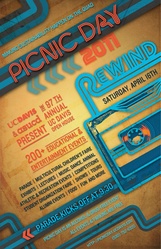
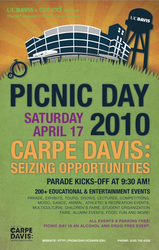
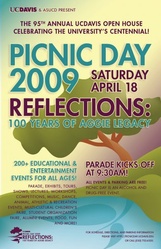



Comments:
You must be logged in to comment on this page. Please log in.